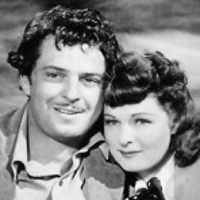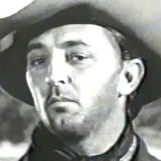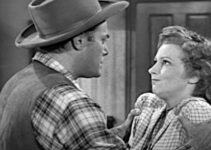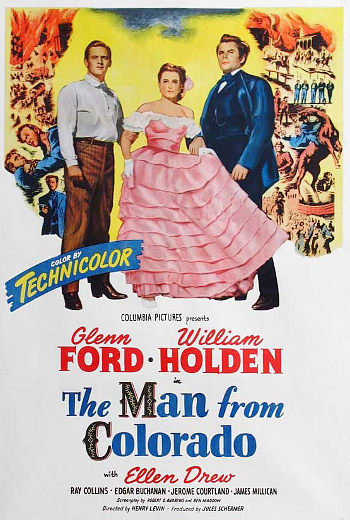 Glenn Ford is Owen Devereaux, a Union colonel whose cavalry patrol comes across a group of ragtag Confederate soldiers in Colorado in April 1865.
Glenn Ford is Owen Devereaux, a Union colonel whose cavalry patrol comes across a group of ragtag Confederate soldiers in Colorado in April 1865.
Badly outnumbered and outgunned, the Rebels run up a white flag. Devereaux sees them do so through his binoculars.
But he orders his artillery to open fire anyway, causing the death of 100 Confederate soldiers at Jacob’s Gorge.
Later, he learns the war ended before those men died, when Lee surrendered at Appomattax Courthouse back in Virginia.
Still, he and his best friend Del Stewart (William Holden) return home to a heroes’ welcome. Both love the same girl, pretty Caroline Emmet (Ellen Drew).
Turns out, Devereauz wins over the girl and a plum post-war assignment, an appointment as judge for the Colorado Territory.
Stewart agrees to serve as his chief law enforcement officer. Under one condition: That Devereaux stop wearing a gun.
Stewart suspects his longtime friend has suffered mentally from three years of war. He found a white flag of truce in the rubble at Jacob’s Gorge.
His suspicions appeared confirmed when the lone Confederate survivor confronts Devereaux with the truth about that battle, and is brutally gunned down by the newly appointed judge.
And post-war trouble is brewing in this Colorado mining town.
Soldiers returned to the mines they owned, only to discover they’ve been claimed by the Great Star Mining Co.
Presiding over the case, Devereaux sides with the mining company, pitting his former soldiers against him.
And Del Stewart might not be able to prevent the outbreak of violence he fears.
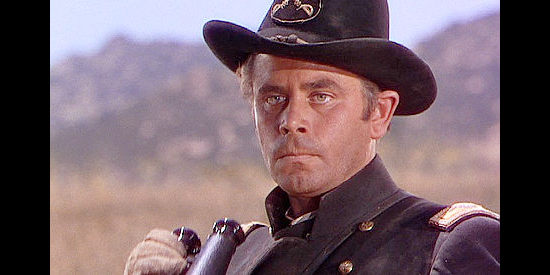
Glenn Ford as Col. Owen Devereaux sees a flag of surrender and ignores it in The Man from Colorado (1948)
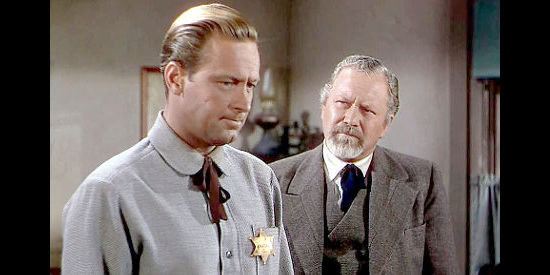
William Holden as Del Stewart, expressing concerns about Owen’s mental state to Doc Merriam (Edgar Buchanan) in The Man from Colorado (1948)
Ford turns in a fine performance in a rare opportunity to play the villain of the piece, though one suspects he could have been just as effective without the mad professor hair-do.
He’s a man who fears he’s going crazy, kill-crazy perhaps. But he’s also a man used to giving orders and having those orders followed without question.
Holden’s also convincing as the former friend who sticks by Owen Devereaux as long as he can stand to.
But he winds up determined to rob Devereaux of power and protect the woman he loves, who just happens to be the judge’s wife.
The unusual climax plays out against the backdrop of a raging fire, set by Devereaux’s henchmen, to smoke Holden’s wounded Del Stewart from his hiding place.
According to IMBd, that fire raged out of control on the set. Holden and Ford were among those who tried to contain it until firefighters arrived.
Released in December 1948, the film was one of the 50 biggest grossing of 1949, according to Variety. Westerns ranking higher on that list included “Whispering Smith,” “Yellow Sky,” “She Wore a Yellow Ribbon” and “Streets of Laredo.”
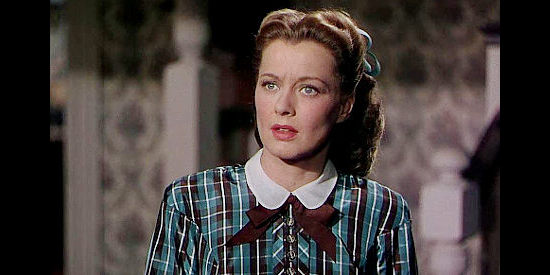
Ellen Drew as Caroline, balking at the suggestion of attending hangings planned by her husband in The Man from Colorado (1948)
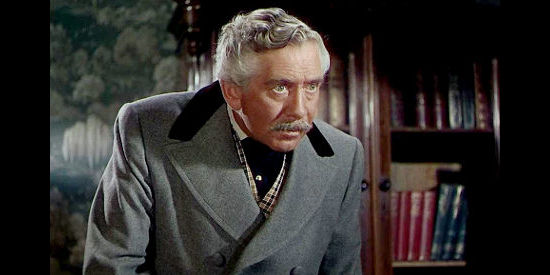
Ray Collins as Big Ed Carter, owner of the Great Star Mining Co, who gets Devereaux appointed judge in The Man from Colorado (1948)
Directed by:
Henry Levin
Cast:
Glenn Ford … Owen Devereaux
William Holden … Del Stewart
Ellen Drew … Caroline Emmet
Ray Collins … Big Ed Carter
Edgar Buchanan … Doc Merriam
Jerome Courtland … Johnny Howard
James Millican … Jericho Howard
Jim Bannon … Nagel
William “Bill” Phillips .. York
Denver Pyle … Easy Jarrett
Ian MacDonald … Jack Rawson
Myron Healey … Powers
Ray Teal … Bartender
Runtime: 100 min.
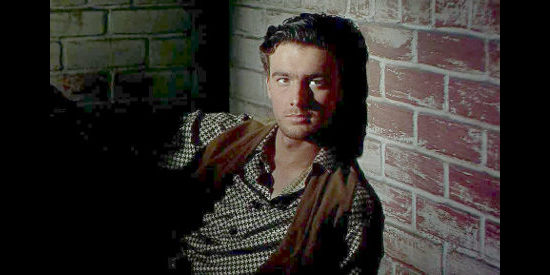
Jerome Courtland as Johnny Howard, sitting in jail for a crime his brother committed in The Man from Colorado (1948)
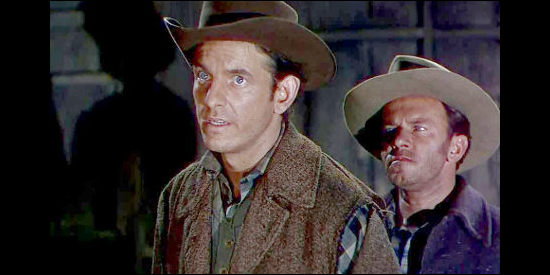
Denver Pyle as Easy Jarrett, who acts as a spy for Judge Owen Devereaux in The Man from Colorado (1948)
Memorable lines:
Owen Devereaux, writing in his diary: “I killed a hundred men today. I didn’t want to. I couldn’t help myself.”
Confederate officer: “What for, colonel? For a morning’s entertainment? For pure crazy love of killin’? You’re no hero. You’re an insane murderer.”
Owen Devereaux: “I won’t pull the old line about the best man wins. Call it the lucky man.”
Del Stewart: “No, Owen.”
Devereaux: “Don’t you think Caroline is the only one who has the right to say no or yes.”
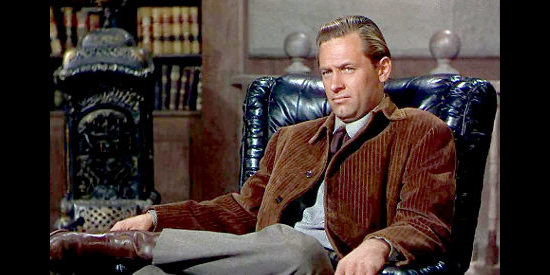
William Holden as Del Stewart learns of Devereaux’s plans to marry Caroline in The Man from Colorado (1948)
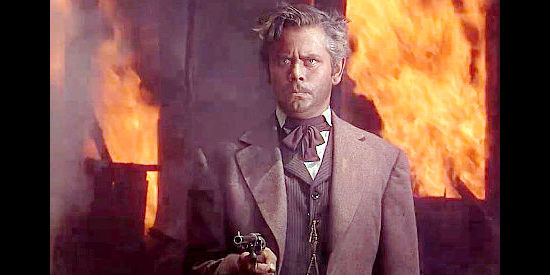
Glenn Ford as Judge Owen Devereaux, ready for a showdown as an inferno rages behind him in The Man from Colorado (1948)
Caroline: “It just doesn’t seem right, him (Del) not being here for my birthday. Oh, well …”
Owen Devereaux: “Trouble is, you could only marry one of us.”
Del Stewart to Jericho: “You’re gonna dance on a rope end sooner or later anyhow. But Johnny’s kind of young to die on nothing but cock-eyed loyalty to his brother.”
Owen Devereaux: “Do you love me?”
Caroline: “You won’t let me anymore.”
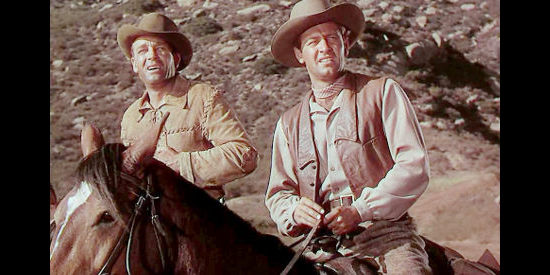
James Millican as Sgt. Jericho Howard and William Holden as Del Stewart, realizing they’re too late to help a colleague in The Man from Colorado (1948)
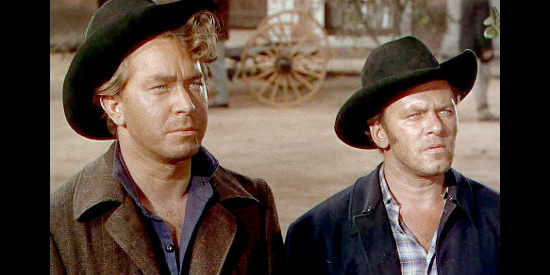
Mikel Conrad as Morris and William Phillips as York, two of the soldiers who return home to find someone else claiming ownership of their mines in The Man from Colorado (1948)
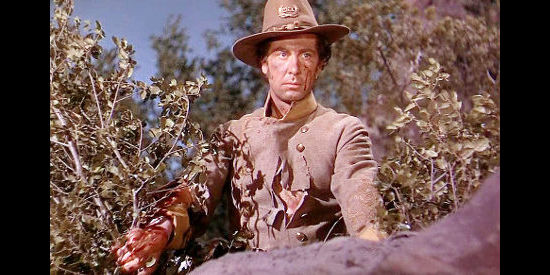
Dick York as the Confederate major whose men are needlessly slaughtered in The Man from Colorado (1948)
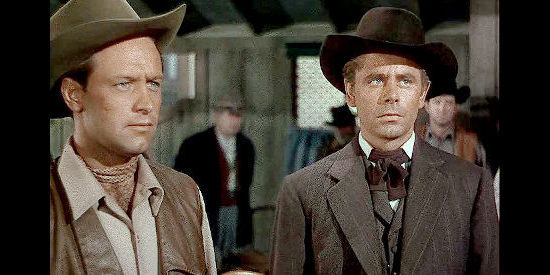
William Holden as Del Stewart and Glenn Ford as Owen Devereaux, questioning one of their former soldiers in The Man from Colorado (1948)

